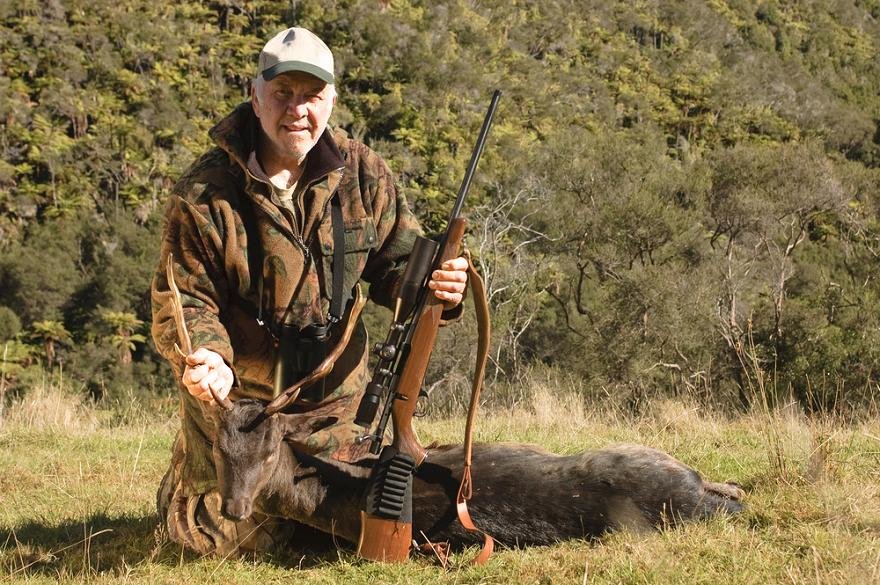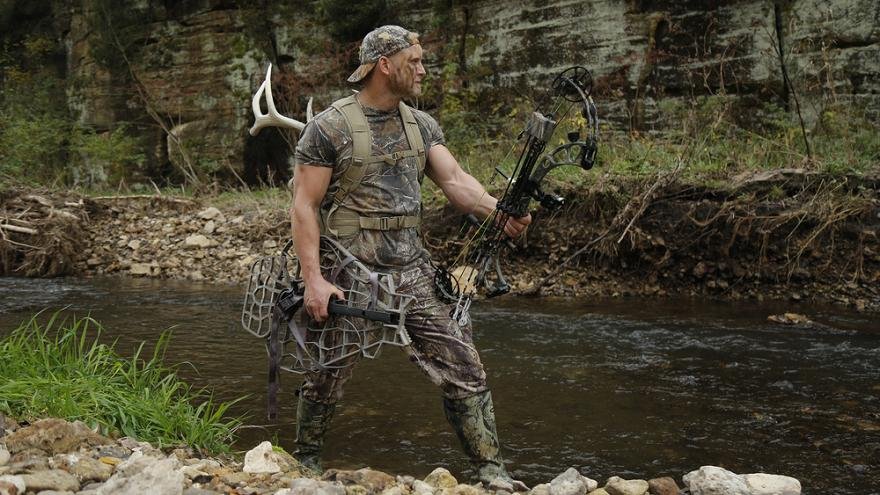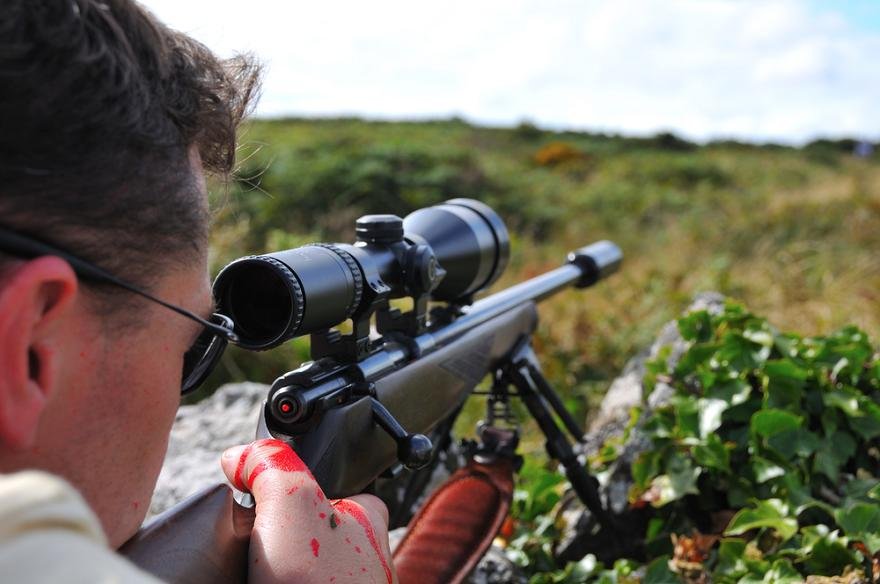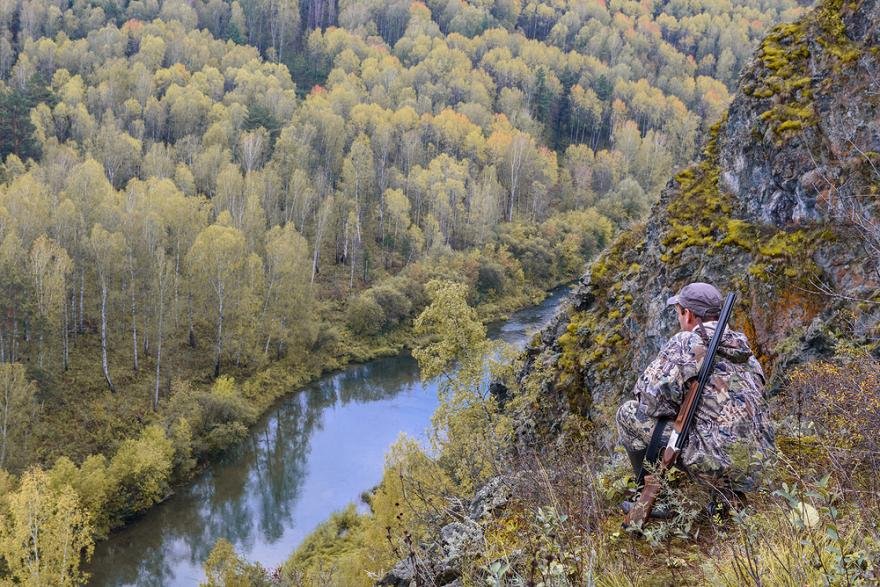The hunt is one of the most primal experiences a person can have, and even though we now live in an age with social media, and food delivered to our doorstep, there’s still nothing quite like pitting your skills as a hunter against challenging prey like a deer. Unlike so many other things in life, when you’ve successfully taken down a deer, that’s 100% an accomplishment you’ve earned by honing your skills as a hunter.
But hunting deer, or any other animal, isn’t something that you can do on a whim, not if you’re serious about success. While it’s true that hunting, especially with friends and family, can be a rewarding, bonding experience, true success only comes from serious discipline, and a willingness to improve your hunting skills. To do that, we suggest you follow some of these essential tips.

Work With The Wind
In hunting, understanding the sensory world is everything. And while the accuracy of human smell isn’t that precise, the same can’t be said for much of the prey humans track, including deer. If you’ve ever caught the scent of someone’s barbecue meal coming into your yard from the wind, amplify that ability by several orders of magnitude for deer, and imagine that it’s you being smelled.
While it’s true that you can’t control the weather or the way the wind blows, you can always be mindful of your position in relation to the wind, and any deer you may be tracking. Always try to adjust your position, so your scent isn’t blown towards your target. Otherwise, you may lose your opportunity before you even had a chance to take advantage of it.
– Read also: Details To Look For While Deer Hunting In The Wind
Mask Your Scent
In the same way that the wind can carry your scent, modern hunting techniques now give hunters a window of opportunity for a few moments, and in some cases, this is all the difference between a clean kill and a complete miss. You’re not going to be able to stay downwind of a target all of the time. But being careless and wearing strong aftershave, or deodorant, for example, are ways to instantly alert deer to flee the moment they have your scent.
But what if you leave them uncertain? Wash with scent free soap. If you’re returning to a favorite location you’ve been before, consider storing your hunting clothes in a bag that also has leaves and dirt from the area to mask the scent of the clothing. Give yourself every opportunity to mask just how foreign your odor is so that deer don’t instantly react and flee when they have your scent.

Use A Bow Or Crossbow
If you’re thinking strictly range and ease of use, the hunting rifle is going to win every time. It is, comparatively speaking, the cheapest hunting weapon, the easiest to use, and has the greatest range. So for hunters that are looking for maximum convenience, and ease, the rifle is it.
However, that doesn’t mean that the rifle is a runaway winner. For some, there’s more to the hunt than the quickest and easiest kill. Weapons like the bow and crossbow require a greater amount of skill and stealth as a result of needing to get closer to increase the chances of success. Many hunters claim the adrenaline rush from a traditional bow-based kill has no equal.
However, a practical reason for using a bow or a crossbow is that the weapon is quieter. The discharge from a rifle can, under the right circumstances, be heard for miles. It is loud and disruptive enough that it puts deer on edge, and they flee in “high alert.” If you miss your target, this means that every target, potentially for miles, is now running away from the source of the noise. With a bow or crossbow, there is no recoil, and no loud discharge, meaning that normal deer routine is not widely disrupted, affording you more chances to hunt in the area.

Silence Is Golden
Another tip that emphasizes the sensory world that deer live in. Hunting is all about tracking deer and getting into the ideal range to make the kill. While keeping your scent from being too conspicuous is important, being quiet is just as important. Someone laughing and telling dirty jokes to your friends, snapping twigs and branches, opening up beer cans and throwing them against trees, or randomly firing a gun into the air is going to have a great walk in the woods, but is unlikely to see any deer.
Deer are prey. They are constantly on the alert for anything that is out of the ordinary, and that includes strange noises as well as strange smells. Navigate the area with caution and awareness. If you make enough noise, you alert everything in the area that something foreign is present, and they’ll avoid the source of the disturbance since you’ve announced your location.
Use The Right Tools
One of the greatest adaptations that humans have is that we are tool makers that put those tools to use in ways that extend our abilities far beyond that of other animals. This is especially true in hunting, where the right tool can mean the difference between a successful hunt and coming back empty handed. When you’re out in the field, you need to make sure you have the tools, like a good knife, that does what you need.
It’s also important to make sure that everything is easily accessible. It would help if you weren’t going into the field with your hunting essentials tossed into a plastic bag from a convenience store. A good backpack, for example, gives you easy access to your things, while protecting them from the environment.

Study The Environment
Finally, while hunting is not the same as going to war, or entering a combat situation, one thing remains true. Those that know the land have an advantage. Study the landscape and become familiar with it. Hunt in the same territories so that you know the best feeding spots, the best ambush sites, where the water is that animals will use.
An unwillingness to familiarize yourself with a hunting ground dramatically decreases the likelihood of success.
FAQ’s
1. What attracts deer the quickest?
The fastest way to bring deer in is by offering food they love — such as corn, apples, acorns, or commercial attractants with sweet scents like molasses. During the rut, doe urine or estrus scent can also pull in bucks fast. Just make sure baiting is legal where you hunt.
2. What is the best hunting strategy?
The most reliable approach is playing the wind and being patient. Set up downwind of travel routes, food sources, or bedding areas. Stay still, quiet, and scent-free. Many experienced hunters also swear by “patterning” deer — studying their habits and adjusting your setup to match their daily routine.
3. What is the best time of day to hunt deer?
Early morning (just after sunrise) and late afternoon (a few hours before sunset) are the best times. Deer are crepuscular, meaning they’re most active during these low-light periods when they move between feeding and bedding areas.
4. What makes a great hunter?
Patience, observation, and discipline. Great hunters read signs, know when to move and when to sit still, and respect the animal and the environment. Skill with a weapon helps, but woodsmanship and understanding animal behavior matter more.
5. What smell do deer hate the most?
Human scent is at the top of the list. They also dislike strong artificial odors like gasoline, cigarette smoke, and soap. That’s why scent control — using scent-free detergent, sprays, and wind awareness — is so important.
6. What is the best weather to hunt deer in?
Cool, calm, overcast days are ideal. Deer move more when it’s chilly (30–50°F / -1–10°C) and before storms. A light breeze is fine, but heavy wind or downpours often reduce activity.
7. What is the number one rule of hunting?
Safety first. Always treat every firearm as loaded, know your target and what’s beyond it, and never take a shot unless you’re certain. Ethical, safe hunting ensures a successful and responsible season.
8. What is the hardest game to hunt?
Many hunters say mature whitetail bucks or elk because they’re wary, smart, and unpredictable. Other contenders include mountain sheep or African plains game, which demand endurance and precision.
9. What is the hunter killer strategy?
This strategy means being proactive and tactical — learning patterns, scouting ahead, and making strategic moves instead of waiting passively. It’s about anticipating where the deer will be and positioning yourself to intercept them.
10. Should I hunt all day during the rut?
Yes — if there’s ever a time to stay in the stand from dawn till dusk, it’s during the rut. Bucks are unpredictable and may move at any time of day while chasing does.
11. Where do bucks go during the day?
Bucks usually bed down in thick cover or dense woods during the day to stay hidden. They prefer areas with good visibility and quick escape routes.
12. What hours are deer most active?
Dawn and dusk are peak activity times. However, during the rut or cold fronts, midday movement is common too.
13. What should every hunter have?
At minimum: a reliable weapon, appropriate ammo, sharp knife, warm layered clothing, scent control products, safety harness, and a first-aid kit. Binoculars, a rangefinder, and a headlamp are also extremely useful.
14. How to train like a hunter?
Focus on endurance, leg strength, and stability. Hiking with weight, shooting from awkward positions, and practicing breath control all help. Also, learn to move quietly and observe your surroundings — mental training is just as important.
15. What is the mindset of a hunter?
A hunter’s mindset is patient, respectful, and strategic. They understand that success comes from learning the land, reading signs, and adapting — not from rushing.
16. What type of personality is a hunter?
Hunters tend to be observant, patient, and focused. They value self-reliance, discipline, and connection with nature.
17. How to be a skilled hunter?
Time and experience. Scout year-round, learn deer behavior, practice shooting, and improve your tracking skills. Every hunt teaches you something — even the unsuccessful ones.
18. What is hunter discipline?
It’s the ability to wait for the right shot, respect limits, and follow safety rules. Discipline is what separates ethical hunters from careless ones.
19. What are the qualities of a hunter?
Patience, perseverance, awareness, humility, and ethical responsibility. A great hunter is a student of nature and a steward of wildlife.
20. Are you a hunter or farmer?
This is often used metaphorically. A “hunter” is proactive and driven, seeking opportunities. A “farmer” is patient and nurturing, waiting for growth. In the field, good hunters often have a mix of both.
21. What type of hunter is a human?
Humans are persistence hunters — we rely on endurance, intelligence, and teamwork rather than brute strength or speed.
22. What is the best season to hunt deer?
The rutting season (late October through November in most regions) is the most productive. Bucks are more active and less cautious, increasing your chances of a successful hunt.
23. What time are most bucks killed?
The first few hours after sunrise and the last hour before sunset see the most harvests. During the rut, midday can also be surprisingly good.
24. Do deer sleep at night?
They don’t sleep like humans — instead, they take short naps throughout the day and night. They’re light sleepers and always alert to danger.
25. What weather do deer prefer?
Cool and calm conditions. Light rain doesn’t bother them much, but extreme heat, heavy rain, or strong winds reduce movement.
26. Do deer like apple juice?
They’re attracted to sweet smells, so apple juice, cider, or crushed apples can work as a lure. Again, check local baiting laws before using it.
27. How do you call a buck?
Use grunts, rattling, or doe bleats. Short grunts mimic a buck’s presence, while rattling imitates fighting bucks. During the rut, doe bleats are especially effective.
28. What season are deer more likely to roam?
The rut. Bucks travel far from their home ranges searching for does, so movement spikes dramatically during this period.
29. Do deer move around noon?
Usually less, but during the rut or after weather changes, deer can and do move midday. Many hunters overlook this time — but it can be productive.
30. What age of deer is best to shoot?
Most hunters aim for 3.5 years or older. At that age, bucks are mature but still provide excellent meat and antlers.
31. What is the best exercise for hunting?
Hiking with a weighted pack builds endurance and strength. Combine it with squats, lunges, and balance exercises to handle rough terrain and long sits.
32. How to talk like a hunter?
Use clear, simple terms and avoid loud conversations in the field. “Sign,” “trail,” “rut,” and “scrape” are common hunting words. Most importantly, know when not to talk — silence is a hunter’s best ally.
33. How to pounce as a hunter?
Move slowly, stay downwind, and time your approach when the animal’s head is down or obscured. Sudden moves ruin hunts — patience and timing are everything.
34. Which deer is hardest to hunt?
A mature whitetail buck is one of the most challenging. They’re cautious, smart, and often change patterns quickly. Old mule deer bucks and sika deer are also tough to hunt.
35. What time of day are most deer killed?
Morning and evening remain the top harvest times. During the rut, mid-morning to midday also produces surprising results.
36. Is it easier to hunt in winter?
It can be. Snow makes deer easier to track, and food scarcity means they’re more predictable. However, cold weather requires more preparation and endurance.
Read more: 7 Best Hunting Boots for Deer Hunting
